- Home
- Liz Braswell
Unbirthday
Unbirthday Read online
Copyright © 2020 Disney Enterprises, Inc.
All rights reserved. Published by Disney • Hyperion, an imprint of Buena Vista Books, Inc. No part of this book may be reproduced or transmitted in any form or by any means, electronic or mechanical, including photocopying, recording, or by any information storage and retrieval system, without written permission from the publisher. For information address Disney • Hyperion, 125 West End Avenue, New York, New York 10023.
Cover design by Scott Piehl and Gegham Vardanyan
Cover illustration by Jim Tierney
ISBN 978-1-368-05640-3
Visit disneybooks.com
Contents
Title Page
Copyright
Dedication
A gentle note, Dear Reader
Alice as You Remember Her
Chapter One
Chapter Two
Chapter Three
Chapter Four
Chapter Five
Chapter Six
Chapter Seven
Chapter Eight
Chapter Nine
Chapter Ten
Chapter Eleven
Chapter Twelve
Chapter Thirteen
Alice as She Is
Chapter Fourteen
Chapter Fifteen
Chapter Sixteen
Chapter Seventeen
Chapter Eighteen
Chapter Nineteen
Chapter Twenty
Chapter Twenty-One
Chapter Twenty-Two
Chapter Twenty-Three
Chapter Twenty-Four
Chapter Twenty-Five
Chapter Twenty-Six
Chapter Twenty-Seven
Chapter Twenty-Eight
Chapter Twenty-Nine
Chapter Thirty
Chapter Thirty-One
Chapter Thirty-Two
Chapter Thirty-Three
Chapter Thirty-Four
Forever and Ever Alice
Chapter Thirty-Five
Chapter Thirty-Six
Chapter Thirty-Seven
Chapter Thirty-Eight
Chapter Thirty-Nine
Chapter Forty
Chapter Forty-One
Chapter Forty-Two
Chapter Forty-Three
Chapter Forty-Four
Epilogue
About the Author
For my sister, Sabrina.
We are not Mathilda and Alice but have moments of each.
I forgive you for that time you tricked me into eating a fancy chocolate with a hairball inside.
Sort of.
—L.B.
As you are probably already aware, this book is a work of Nonsense.
That being said, it behooves us to remind you that the Mad Hatter is a fictional character and doesn’t conform to the strict rules of our own world.
To wit: mercury is deadly poisonous.
Hatters really were said to have gone mad in the nineteenth century because of exposure to mercury in their hat-making processes: in effect, they suffered long-term mercury poisoning.
You cannot eat the fish from many rivers and lakes of America even today because of the deadly mercury that lies on their muddy bottoms eternally, the result of toxic industrial pollution.
In this book the Hatter drinks mercury.
You, dear reader, cannot.
It will kill you.
—L. Braswell
Morning sunlight waved a cheery hello on the papered walls of an equally cheery bedroom. It had rained overnight, a proper rain—hard with big droplets—and the day came fresh scrubbed and eager. The air that drifted through the open window was chill and sharp and had a bit of a kick to it. A flock of little sparrows who had been nest mates barely a week earlier chirruped excitedly back and forth in a way that would eventually result in either a sudden flight en masse, or feathery fisticuffs.
Even the hammer strikes of Mrs. Anderbee’s solid heels against the floor downstairs sounded springier and more energetic than usual.
The girl lying so peacefully in her brass-frame bed, thick golden hair spread around her head and neck like the resplendent halo of an angel, was coaxed from sleep to wake at once by the abundance of all these cheerful noises. Her eyes snapped open, the long lashes on her lids waving like wheat with the suddenness of the motion.
“Today,” Alice declared, “is a perfect day for adventure!”
She grinned and basked in the glory of her decision for a moment, then shot out of bed. Dinah, a cat both grumpy and unwilling to see the day for what it was, stretched once in place (where formerly her mistress’s warm feet had been), then closed one elderly eye to the day and was asleep again seconds later.
“Sorry, old girl!” Alice said, giving her a kiss. “But tempus fugit, you know; time waits for no one!”
Of course, this being the time and place that it was, adventurers couldn’t just run out the door in their chemises. It would be scandalous. And so Alice began the tedious process of donning all the layers necessary to going out into the world as a respectable young English lady. She had:
Drawers that went down to her knees.
A crinoline that looked like a cross between a bee skep and a cage. It was basically a series of steel hoops in diminishing circumference that circled her lower body from her calves to her waist. This held the skirts worn on top of it out from around her like a giant bell with her legs the clapper.
Corset.
She didn’t tight-lace, despite the fashion and the pressure from friends. On this one thing Alice and her sister agreed: it was pure foolishness. Her waist was fine as it was, thank you very much, and she left the corset to its main job: keeping her back aligned and her womanly attributes smooth and in place.
Petticoat.
Petticoat.
Actual dress. A nice summer-weight gingham in blue and white.
Jacket and hat.
And finally, camera bag.
Alice hurried through all of this as fast as she could and then nearly skipped like a girl much younger than eighteen as she ran down the stairs…only remembering to try to keep her footsteps silent at the very last—and far too late—minute.
“Alice!” a strident female voice cried out. Mathilda, her sister. Of course.
Well, since she had been heard, she might as well have some breakfast.
“Good morning, Mother, Father, Sister,” she said grandly, sweeping into the dining room. Her family was gathered at one end of the long table like refined squirrels, cracking soft-boiled eggs, spreading jam on toast, sipping tea and coffee, and generally looking completely at ease in the formal and bric-a-brac-filled room. Her mother turned a plump, still-pink cheek for a kiss and Alice obliged. Her father’s face was mostly hidden behind the newspaper, but she managed to get in a quick peck, not quite on his muttonchop.
She patted her sister on the shoulder dismissively, as if brushing off some dandruff.
“Married yet?” her father asked from behind the paper.
“No, Papa.”
“In the stocks yet?”
“No, Papa.”
“Hmm. Good.” He shook his paper to facilitate the turning and folding of a page and then continued reading about things happenings in foreign places, his favorite type of story.
“Are you sure it’s good, Papa?” Mathilda asked. She was severe, beautiful in a slightly off-putting way, dark eyes and lashes and hair where her younger sister’s were light. Her somber dress was as drab as Alice’s blue-and-white one was gay and summery. But if they had ever really made an effort to go out together—and if Mathilda ever made an effort with her appearance beyond brushing her hair—they could have owned all of the town of Kexford.
Not that Alice wanted to own Kexford. But it would have been an absolute gas f
or one party at least.
“She’s eighteen, you know,” Mathilda prodded, spreading jam on her toast most seriously.
“And I believe you’re twenty-six,” her mother observed.
“I have prospects!”
“Yes, yes you do,” her mother said quickly and soothingly.
“I’ll keep my baby girl Alice for as long as I possibly can,” her father said from behind his paper. “Don’t go interfering with that.”
“My dear friend Mr. Headstrewth has a friend—Richard Coney,” Mathilda said, turning to Alice and ignoring her parents. “I believe I have told you about him a number of times. I think you may even have met him once? Very bright young man. Handsome. With a great future before him—he’s already working on Gilbert Ramsbottom’s election campaign. I have invited him—”
“Oh, he sounds lovely, yes, thoroughly interesting, fantastic, do keep me informed of his doings, absolutely! Good morning, and goodbye!”
Alice winked at her mother, who tried very hard not to smile.
Then she grinned and spun away, and it wasn’t until Mathilda turned back to her breakfast with a huff that she noticed her carefully buttered and jammed toast was missing.
Walking down the sunny road, Alice thoroughly enjoyed her purloined breakfast, so expertly buttered and jammed. After wiping her lips and cheeks with the back of her hand like a cat she raised her face to the sun, enjoying its warmth as it hit her skin. For only a moment, of course, before it did any real damage. She adjusted her hat and—
“Oh dear.”
She had forgotten her gloves.
“Oh, my fur and whiskers,” she sighed. “Not respectable at all today.”
A momentary feeling overcame her. It wasn’t sadness exactly. But it wasn’t just nostalgia, either. There was a golden drop of happiness in the feeling, whatever it was, as warming and delightful as sunlight. A memory of old dreams that had worn thin like the comfiest pillowcase one couldn’t bear to throw out.
Wonderland.
The details had dimmed long ago but the feelings remained: adventure, magic, fascinating creatures. True, not all her imagined adventures in Wonderland had been fun or safe. And not all the people had been particularly nice or polite. Some of the flowers in Wonderland were downright violent.
And the Queen of Hearts! She had wanted Alice dead! “Off with her head!” The phrase still sent shivers down Alice’s spine.
But…
She hadn’t had another dream like that one since.
“Stuff and nonsense,” Alice declared, shaking her head. “It’s a gorgeous day! Let’s go find the magic right here!”
Right here was, of course, Kexford, a shining little town of university professors, ancient halls, glorious green parks, and glittering canals. There were gleaming white walkways, ancient stone buildings, and gardens so tiny and bright they practically sparkled like jewels. Everything was ordered and perfect and old in these hallowed grounds—even down to the properly wrecked, robed students hurrying to class after late-night partying or discussing Petrarch.
(Alice’s house was just north of the university area, a fine large place with gardens and a lawn; not too long a walk to where the action was downtown, but not close enough to hear “Gaudeamus Igitur” being belted out at three o’clock in the morning.)
After waking from that magical dream ages ago, little Alice had devoted all her free time to searching the town for anything that reminded her of Wonderland. No place was safe from her explorations: every bell tower she could sneak into, every alleyway she could slip down when her parents’ backs were turned. Top to bottom, high and low, nary a stone unturned.
(Mostly low: rabbit holes and mushrooms, tiny caterpillars and large spiderwebs, dumbwaiters and surprisingly small doors in other people’s houses she really ought not to have explored and opened.)
Her wooden treasure box had contained rather more than the usual number of strange trinkets children tend to collect: tiny brass keys, tiny glass bottles, leftover halves of unusual biscuits, a left white glove, a right off-white glove, scraps of paper with the words EAT ME and DRINK ME laboriously written over and over again as she tried to match her flourishes to memory.
Alice hadn’t been a morose girl—far from it—but she wondered sometimes if the reasons she never again dreamed of Wonderland were just a little bit her fault.
“Of all the silly nonsense—this is the stupidest tea party I’ve ever been to in all my life!”
“Well, I’ve had enough nonsense. I’m going home—straight home.”
“Oh no, please. No more nonsense.”
No more nonsense. There, she had said it herself. And her subconscious had obliged and kept her nightly excursions to a world with little nonsense in it at all.
So Alice had tried her hand at drawing the few things she remembered clearly from her dream (the Cheshire Cat, the White Rabbit, a pretty little golden key) or the curious things she saw while she was out exploring (a student with surprisingly pointed ears, an interesting clump of moss, part of a stone wall with vines that looked like they could be pushed aside to reveal a hidden entrance to somewhere fantastic).
“Hmm,” her father had said, looking over her sketches.
“We don’t have much artistic ability in my side of the family, either,” her mother had commented.
“She does notice many…obscure things. Even if she can’t…reproduce them.”
“Yes, she spends quite a bit of her spare time noticing things. Perhaps she needs some sort of focus for that—er, besides drawing, I mean?”
And that was where Aunt Vivian had come in.
She couldn’t draw, either, but she could sculpt a fair piece, hosted literary salons, was occasionally involved in rather scandalous doings, and wore trousers like a coal-hauling pit lass. Her house was running over with fringed lamps, art made by her friends, incense burners, and velvet. She was not married. In fact, she was just about everything a family could hope for in a black sheep.
And she helped her brother and his wife (and their daughter) by fulfilling that role perfectly: she bought her niece a camera.
One of the latest models, a Phoebus box camera. It was a beautiful little thing and extremely portable, requiring neither a tripod nor bellows. It fit very nicely into a medium-sized case and could be brought out to quickly capture whatever took Alice’s fancy—provided the light was bright enough.
(Aunt Vivian already had a darkroom sufficient for developing its glass plates; she was famous for the costumed tableaus she took at her salons with a much more traditional and giant-sized portrait camera.)
Alice was delighted. There was something inherently Wonderlandy about the whole process: light and shadow and mirrors and glass and lenses and images appearing magically.
A side effect of the new hobby was spending a lot more time with her aunt, which relieved her parents (who were concerned about her wandering the streets of Kexford by herself) and worried her sister (who believed Aunt Vivian was a terrible influence; not so much modern as profligate). Mathilda need not have been overconcerned, however; Alice loved her aunt, but she was now eighteen and had her own agenda—which had nothing to do with artists or vermouth or poppies or trousers.
Alice of course used the camera to document anything the remotest bit mysterious. She spent her days on what she called “photo walks”: looking for objects and people that hinted at a hidden, fey, or wild side, which she would try to coax out with her camera. Once she found a potential subject she worked long and hard composing the shot, sometimes with additional mirrors or a lantern if it was in a dimly lit alley. She developed these images in her aunt’s darkroom and then laid them out around her own room, studying them and trying to conjure a world out of what she saw there. Sparkling dew on spiderwebs, gloomy attics, a pile of bright refuse that might have hidden a monster or poem. The elfin qualities of a child, her eyes innocent and old at the same time.
She never told her parents (or her sister) about her visits to the les
s storybook parts of Kexford. But it was where things weren’t kept quite as neat or perfect or orderly that she felt magic and nonsense had a chance to bloom.
And that was where she was headed on this glorious day.
Down the road and south…and then east, away from the pretty campuses and annoying students. She chose her route to pass Mrs. Yao’s tea shop. Really it was too beautiful a day for a cup of oolong and gossip, and she was still full from her stolen bread and jam for a sweet bun. But she turned down the tiny twisty street anyway and contented herself with a smile and wave to the woman behind the window. Mrs. Yao smiled and waved back. She served her customers out of brightly mismatched cups and plates from England, China, and even Russia—which was magical, and felt a bit like Wonderland.
Just past the tea shop, under a rainspout, was a tiny, delicate fern that had not been there the week before. Alice’s questing eyes immediately spotted its out-of-place bright greenness, its patterned and gracefully uncurling frond. Definitely magical. She gauged the light then pursed her lips sadly. The narrow street was dismally dark, she had no lantern or mirror, and only a few more film plates left. None to waste on potentially terrible shots.
“Apologies, young master fern,” she said, giving it a little curtsy. “Maybe next time, when you’ve grown a bit.”
Or opened up like a telescope, really.
Following the twisty street around, farther into a tangle of old buildings, she stooped through a low archway and finally emerged at her real destination. At one time the little open area had been officially called Wellington Square but was now known as simply the Square. As in the Square where many of the local children met up and played, often the sons and daughters (or orphans) of immigrants who weren’t necessarily welcome in the nicer parks. Alice took their portraits and listened to stories of their homelands and travels to England—some of which, especially with the younger sitters, were mixed up with fairy tales from their mother countries.
Today several of the children had a ball and were playing with it in a corner, scuffing up the dirt. In another corner three girls were playing a counting game, effortlessly switching back and forth between English and Russian and Yiddish. Alice took out her camera and began composing possible images in her head.

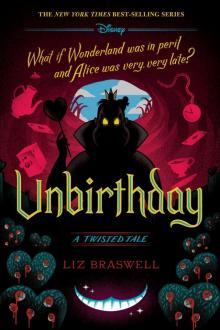 Unbirthday
Unbirthday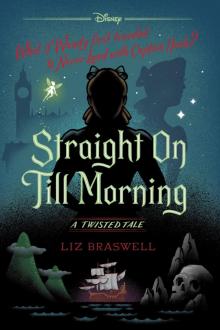 Straight On Till Morning
Straight On Till Morning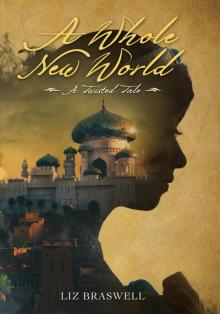 A Whole New World
A Whole New World Once Upon a Dream
Once Upon a Dream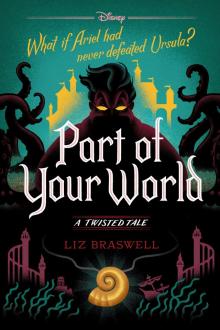 Part of Your World
Part of Your World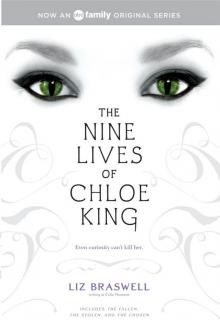 Nine Lives of Chloe King
Nine Lives of Chloe King The Fallen
The Fallen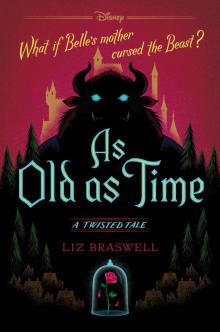 As Old As Time: A Twisted Tale (Twisted Tale, A)
As Old As Time: A Twisted Tale (Twisted Tale, A)